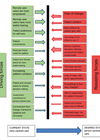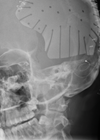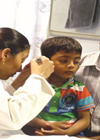ENT features
Cochlear implant care: putting patients in charge
Should patients take charge of their own cochlear implant care? Helen Cullington presents a compelling case that will provoke discussion in implant centres. Around 1400 people receive a cochlear implant in the UK each year. Patients require lifetime annual follow-up...
Worldwide picture of candidacy for cochlear implantation
Who should get a cochlear implant? Candidacy is one of the most important and widely discussed topics in the field of cochlear implantation. Here, Chris Raine and Debi Vickers outline cochlear implant candidacy in the UK, and compare this with...
Achieving consensus on candidacy for cochlear implantation
The British Cochlear Implant Group’s candidacy working group recently ran a national exercise, working towards a consensus on candidacy for cochlear implantation in the UK. Padraig Kitterick and Debi Vickers were instrumental in this exercise, and in the article below,...
Cochlear implantation for single-sided deafness and asymmetric hearing loss
Continuing our sub-theme of cochlear implantation candidacy, Richard Irving and Raghu Kumar review the principles and benefits of cochlear implantation in individuals who have an asymmetric hearing loss. It is well known that cochlear implantation improves auditory capacity, and in...
Cochlear implantation in the developing world: perspectives from the Indian subcontinent
Cochlear implants are an expensive technology, yet profound hearing loss is far from a developed-world phenomenon. On the contrary, incidences of both congenital and acquired hearing losses are high in the developing world. This article explains how an initiative in...
Cochlear implants for children
The field of cochlear implants in children has expanded remarkably over 40 years. Elizabeth Tyszkiewicz reflects on success and current challenges and calls for a national review of outcomes for young adults who received their implants in childhood. Aleena is...
A surgeon’s perspective on the challenges facing cochlear implantation in children
Cochlear implantation in children offers a different set of challenges and goals to adult practice. In this article, Iain Bruce, Professor of Paediatric Otolaryngology in Manchester, UK, explains some of the current clinical and research challenges in paediatric cochlear implantation,...
Extended benefits of cochlear implantation in the elderly
With the challenges presented by an ageing population, Louise Craddock and Charlie Huins describe the benefits of cochlear implants for deaf elderly adults that go beyond improvement of hearing and speech understanding. Introduction People aged over 65 make up 7.4%...
Genetic research on hereditary hearing loss and clinical application in the Chinese population
Congenital deafness in China affects more people than the entire population of Australia. Prof Wang give us a comprehensive insight into one of the main congenital disabilities in China, looking into the causes of deafness and the benefits of genetic...
Ida Institute telecare tools help teens take charge of their hearing healthcare
In this article Ena Nielsen from the Ida Institute discusses new ways to put teens in the driver’s seat of their hearing healthcare needs. The teenage years can be a challenging time for any young person. When hearing loss is...
Using telehealth to engage teenagers
Can we use a teenager’s love of gadgets to re-engage them with their hearing technology? Gwen Carr reports on an innovative use of telehealth to support teenagers who are no longer visiting their hearing healthcare professionals. Parents of children and...
Exploring teenagers’ access and use of assistive hearing technology
Children require good signal-to-noise ratios for optimum listening and learning. The use of remote microphone technology can be of benefit, yet older children often resist using it. Jennifer Groth reviews the challenges facing older children in the use of remote...




















